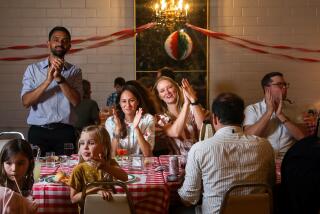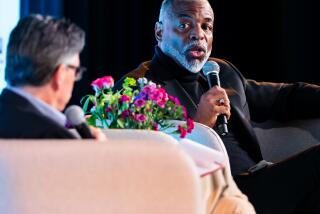For Thousands, Toastmasters International Is More Than Talk
- Share via
Blushing slightly but otherwise unruffled, engineer Kris Vaughan one recent Thursday afternoon faced his peers and fears.
The Seal Beach Speech Bums member began speaking in a conference room at Boeing’s Seal Beach complex shortly after noon in front of about 20 club members. His delivery of “More Quantity, Less Quality Communication” was seamless to the untrained ear.
But not to Mary Romero. As the club’s official “ah” counter for the day, she tallied 37 ah’s and five um’s in the 7-minute, 3-second speech.
“In college, communication is not something that is stressed in engineering,” said Vaughan, 24, a UC Irvine graduate. “You realize it’s a very important tool to communicate with other people.”
Vaughan and the Speech Bums are part of Toastmasters International, an organization dedicated to improving everyday speech, public speaking and self-confidence.
Toastmasters is an 80-year-old educational organization with roots in Orange County. Based in Rancho Santa Margarita, the organization has more than 206,000 members, 40,000 of whom have joined since 1994. Some say its continued success is due to the club’s self-help philosophy.
“I do think they could be considered more of a self-help kind of group,” said Jeffrey Charles, associate professor at Cal State University San Marcos and an expert on service clubs. “They have the appeal of a service club but they also have the self-development appeal.”
Toastmasters has more than 450 clubs in Orange and Los Angeles counties and about 1,200 clubs statewide. Many have names denoting members’ interests or professions, such as Talking Tacos Toastmasters, Singles by the Sea Club and the Toastmasters 4 Writers. Some clubs meet weekly, others more frequently.
In February, film composer Alan Derian joined Toastmasters 4 Writers in Glendale after looking for a few months for ways to improve his public speaking.
“As a teenager I was really shy,” he said. “You wouldn’t know it, but I was. I basically had to learn how to be social with people.”
At a recent meeting, Derian proved how far he had come. In a soothing tone, he spoke confidently for seven minutes on how to pitch a screenplay and how to ask a woman out on a date.
He opened with “What I’ve discovered is that flirting with a woman and approaching someone in the film business is actually very similar.”
The audience immediately warmed to him.
Derian said he was enjoying his newfound confidence. “They’re enjoying my speeches and laughing even when I’m not trying to be funny,” he said.
Traditionally, most one-hour meetings begin with announcements by the club president and the introduction of the day’s Toastmaster, who is in charge of the meetings and delegates tasks such as the “ah” counter, speech evaluator and timer.
At least two prepared speeches are given at each meeting.
The assigned evaluator critiques speech organization, voice, language, gestures and persuasion. Awards are given to the day’s best speakers.
After his last speech, Derian was named most improved speaker and given the best-speech award.
Toastmasters was founded in 1924 in Santa Ana by Ralph C. Smedley, who believed young men needed better communication skills. He called the group Toastmasters Club because the activities resembled a banquet with toasts and after-dinner speakers. Women were admitted in 1973.
Jon Greiner, the group’s president, said he had seen subtle changes in speeches in his 33 years as a member. “Today, everybody wants to be entertained,” he said. “Years ago, humor wasn’t even a part of the equation.”
Toastmasters International considers itself an educational organization and not a service club. Fundraising is against the bylaws, unless used for educational purposes.
Eileen Hayden, who has cerebral palsy and is legally blind, says the group is a great benefit to the disabled. She joined the Orange County Braille Toastmasters Club 11 years ago and is now the club’s vice president. “I thought I could help other people and help myself at the same time,” she said. “I’ve met quite a few friends and learned quite a lot.”
Susie Gulick, who says she has lupus and three types of arthritis, recently won Toastmaster of the Year for the Founder’s District, which covers most of Southern California.
“Nobody even knows I’m in pain,” she said, referring to when she gives a speech. “I don’t even notice it myself.”
More to Read
The biggest entertainment stories
Get our big stories about Hollywood, film, television, music, arts, culture and more right in your inbox as soon as they publish.
You may occasionally receive promotional content from the Los Angeles Times.










